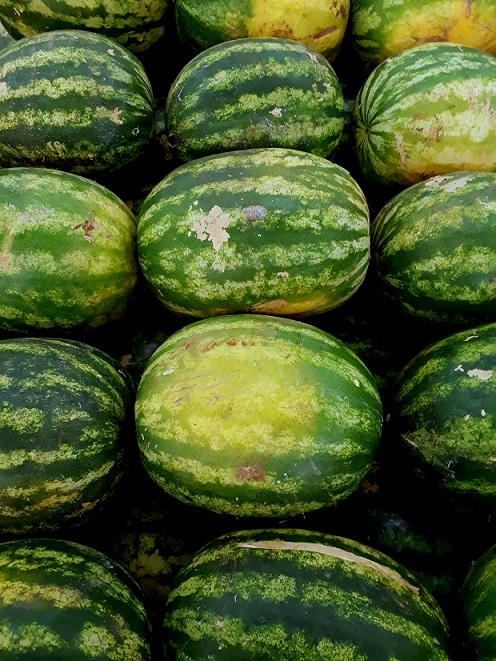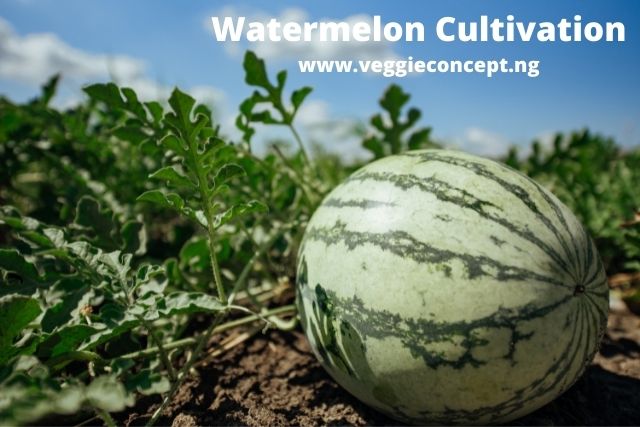11 Top Watermelon Health Benefits That Nutritionists Say Are Backed by Promising Research
Here are all the ways this water-packed summer staple can revolutionize your dietary health.
The watermelon (Citrullus lanatus) belongs to the family Cucurbitacea. It is a vine-like flowering plant that grows and matures within a year. It is a special type of berry which is referred to as pepo. Its leaves are coarse, hairy and pinnately-lobed and white to yellow flowers. It possesses long, weak, trailing, or climbing stems that are five-angled and up to 3 m (10 ft.) long. Young growth is densely woolly with yellowish-brown hairs which disappear as the plant ages. It is grown for its edible fruit known as a watermelon, which has a smooth hard rind usually green, and a juicy, sweet interior flesh, usually deep red to pink, but sometimes orange, yellow, or white, with many seeds. The watermelon grows on vines with large crinkled leaves.

Watermelon is relished by a large number of people across the country and even the world as a whole as a fresh fruit. This is because watermelon is thirst-quenching and is known to be low in calories but highly nutritious therefore, recommended for people that wish to lose weight; and with the high rate of overweight or obesity related issues its demand has sky rocketed. It is a good source of vitamins such as vitamins A and C in form of disease fighting beta-carotene. Potassium is also available in it which is believed to help in the control of blood pressure and prevents stroke and other numerous health benefits watermelon offers to the body. They grow rampantly once established without too much attention.
Nothing tastes like summer more than a crisp, juicy, refreshing slice of watermelon. It’s a staple of backyard barbecues and well-stocked at your local farmers’ markets this time of year. Watermelon — which can actually be considered a fruit or a vegetable, according to the National Watermelon Promotion Board — is incredibly nutritious, too.
Nutritionists say watermelon is low in calories and sugar and chock-full of vitamins, minerals, and antioxidants, making it a great addition to a healthy diet. Plus, it’s fun to eat! “Eating watermelon makes me feel carefree, like a kid again at a summer picnic enjoying the outdoors with the people I care most about,” says Kris Sollid, MS, RD, senior director of nutrition communications at the International Food Information Council.
Here’s an overview of some of the best health benefits of watermelon, according to nutritionists.

Watermelon Nutrition Facts
According to the U.S. Department of Agriculture, 1 cup of watermelon (152 g) contains:
- Calories: 45.6
- Fat: 0.2g
- Cholesterol: 0mg
- Sodium: 1.52mg
- Carbohydrate: 11.5g
- Fiber: 0.6g
- Vitamin C: 12.3mg
- Potassium: 170mg
- Calcium: 10mg
- Vitamin A: 865 IU
- Lycopene: 6,890 micrograms

Is it okay to eat watermelon every day?
Only about 10% of Americans eat the recommended two cups of fruit each day, according to the Centers for Disease Control and Prevention (CDC). Since it’s low in calories and sugar, you can safely eat multiple servings of watermelon every day without second guessing any long-term dietary impact — but Sollid says it’s best for your dietary health to try to vary the types of fruit you eat. Different fruits contain different nutrients, so eating a variety will ensure your body gets everything it needs.
It’s indeed possible to eat too much of anything, including watermelon, adds Grace Derocha, RDN, CDCES, national spokesperson for the Academy of Nutrition and Dietetics. While it may be tempting to work through half or more of an entire watermelon in one sitting on a hot summer afternoon, experts like Derocha say it’s best to eat one cup at a time as a general recommendation, rather than an entire fruit outright.
Watermelon is considered a high FODMAP (fermentable oligosaccharides, disaccharides, monosaccharides, and polyols) fruit, which means it contains short-chain sugars that some people have trouble digesting, Derocha says, so it “may cause bloating or discomfort when consumed in large amounts.”
People with diabetes or who may need to count their carbohydrate servings should also pay attention to their watermelon intake, she adds. Eating too much fruit could introduce too much sugar to your diet, leading to blood sugar fluctuations, which can be risky for people with diabetes.
What are the health benefits of watermelon?
“Watermelon is a naturally low-calorie package,” says Christina Meyer-Jax, RDN, LDN, Standard Process nutrition chair and former assistant professor at Northwestern Health Sciences University. “It contributes key antioxidant nutrients that support disease prevention and overall wellness.”

Here are 11 health benefits of watermelon:
1) It’s frontloaded with essential nutrients
At just 46 calories per cup, watermelon packs a punch when it comes to nutrients. It contains about 15% of your daily vitamin C needs, along with a wealth of other vitamins and minerals including potassium and vitamin A and B6, Sollid says.
Vitamin C strengthens your immune system and helps the body absorb iron, Derocha says, while vitamin A is crucial for skin and eye health. Watermelon is also rich in potassium, which works to lower blood pressure and supports nerve functioning, and vitamin B6, which helps the body break down the proteins that you eat and also boosts the immune system and nerve function.
2) It offers a big dose of lycopene
Lycopene is a natural compound found in watermelon and other fruits and vegetables that has antioxidant properties. The substance is also what gives watermelon its red color; but beyond its hue, lycopene is also good for you, too. Meyer-Jax says it has been shown to decrease the risk of cancer, heart disease, and age-related eye disorders. Lycopene works to protect your cells from damage, Sollid says, and research suggests that it may have blood pressure-lowering effects when consumed regularly through dietary means.
3) Watermelon helps keeps you hydrated
Watermelon is composed of more than 90% water. “As the name implies, watermelon can keep you hydrated,” Derocha explains. “We get 80% of hydration from what we drink and 20% from what we eat; watermelon can definitely help with this balanced intake.”
Most adults don’t drink enough water, and hydration is particularly important in the summertime, when temperatures rise and you may lose fluids from sweating.
Meyer-Jax recommends eating watermelon sprinkled with a little salt after a workout or when you’ve been sweating for a long period of time. “The combination of carbohydrates and salt is ideal for replenishing lost electrolytes and carbohydrate stores,” she says.
4) It contributes to healthy digestion
Watermelon contains a high water content and a small amount of fiber. “Both are key to keeping digestion moving smoothly,” Meyer-Jax says. Fiber adds bulk to your stool and keeps you regular, while water helps move waste through your digestive system.
5) It could help with weight management
Choosing watermelon over another sweet snack can help you feel full longer, Meyer-Jax explains. Limited research published in the journal Nutrients in 2019 found that subjects who were considered overweight or clinically obese and ate watermelon instead of low-fat cookies experienced greater satiety, as an example. Eating watermelon daily was associated with a decrease in subjects’ body weight, body mass index, blood pressure, and waist circumference.
6) It may improve heart health
Research shows that consuming foods with lycopene may reduce your risk for heart disease and stroke. A 2012 study published in the American Journal of Hypertension suggested a link between the fruit and heart disease, as research suggested watermelon extract may reduce blood pressure over a sustained period of time. “The authors suggested that L-citrulline and L-arginine — two of the antioxidants in watermelon — may improve the function of the arteries,” Derocha suggests.
7) It could work to reduce cancer risk
Lycopene found in watermelon may reduce inflammation and oxidative stress, an imbalance between free radicals (the unstable molecules that the body produces naturally, which can cause illness) and the body’s ability to fight their effects. Chronic inflammation can raise your risk for certain diseases, including cancer, and research shows that lycopene has the potential to reduce inflammation and keep cancer cells from growing, which reduces your risk for the diseases. Studies have highlighted that increasing your lycopene intake can reduce your risk for cancers of the digestive tract and prostate cancer.
8) Watermelon may help reduce inflammation
A specific combination of antioxidants, lycopene and vitamin C, found in watermelon can lower inflammation and oxidative damage over time, Derocha explains. Inflammation can cause swelling, pain, or flushed skin for those experiencing it. And chronic inflammation can lead to serious conditions, including cancer, asthma, heart disease, and type 2 diabetes.
9) It’s great for your skin
“The water and vitamins A, B6, and C in watermelon help your skin stay soft, smooth, and supple,” Derocha says. Vitamin C boosts collagen production, which improves skin elasticity and blood flow to the skin. And vitamin A helps repair skin cells, preventing dry, flaky skin, while vitamin B6 helps with skin breakouts.
Lycopene can play a role in protecting your skin from the sun, Derocha adds, making it less likely you’ll get a sunburn. But it definitely doesn’t mean you should skip the sunscreen, she emphasizes; it’s crucial to apply your choice of SPF regularly.
10) It may relieve achy muscles
A small study published in the Journal of Agricultural and Food Chemistry found that athletes who drank watermelon juice saw reduced muscle soreness for up to 24 hours. The juice also helped lower their recovery heart rate. Researchers linked watermelon juice’s ability to relieve achy muscles to its L-citrulline content, which is an amino acid that helps to reduce muscle damage. Although scientists need more concrete evidence to confirm the extent of this benefit, this link might push you to consider adding watermelon juice to your post-workout routine.
11) Watermelon seeds and rind are nutritious, too
When eating fresh watermelon, most people stick to the red or pink flesh. But you can eat the rind and seeds, too, as they offer their own holistic health benefits.
Rinds are lower in sugar and higher in fiber than the flesh of a watermelon, Meyer-Jax says, “When eaten with the rest of the melon, it helps slow down sugar absorption in the gut and mellows the rise in blood sugar.” Watermelon rinds also contain L-citrulline, which may reduce blood pressure and boost athletic performance.
Watermelon seeds, which can be eaten raw or dried, are rich in magnesium — which Derocha explains plays a key role in energy production, nerve function, DNA and protein synthesis, as well as blood pressure regulation. They also contain folate, which can help your risk for cancer and depression. The seeds are good sources of monounsaturated and polyunsaturated fatty acids, which guard against heart attack and stroke and lower levels of bad cholesterol in the blood.
Credit
